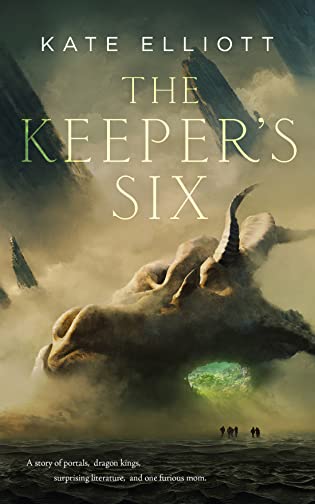 The Keeper's Six by Kate Elliott
The Keeper's Six by Kate Elliott Format: eARC
Source: supplied by publisher via Edelweiss
Formats available: hardcover, ebook, audiobook
Genres: fantasy, portal fantasy, urban fantasy
Pages: 208
Published by Tordotcom on January 17, 2023
Purchasing Info: Author's Website, Publisher's Website, Amazon, Barnes & Noble, Kobo, Bookshop.org, Better World Books
Goodreads
Kate Elliott's action-packed The Keeper's Six features a world-hopping, bad-ass, spell-slinging mother who sets out to rescue her kidnapped son from a dragon lord with everything to lose.
There are terrors that dwell in the space between worlds.
It’s been a year since Esther set foot in the Beyond, the alien landscape stretching between worlds, crossing boundaries of space and time. She and her magical travelling party, her Hex, haven’t spoken since the Concilium banned them from the Beyond. But when she wakes in the middle of the night to her son’s cry for help, the members of her Hex are the only ones she can trust to help her bring him back from wherever he has been taken.
Esther will have to risk everything to find him. Undercover and hidden from the Concilium, she and her Hex will be tested by dragon lords, a darkness so dense it can suffocate, and the bones of an old crime come back to haunt her.
My Review:
There’s a popular image in science fiction – fostered by pretty much all of Star Trek (apropos of yesterday’s book) where Earth and Earth humans seem to be the center of the galaxy no matter how many other races and species might populate it.
(And now I’m wondering if that attitude might have been at least part of the reason why Star Trek: Enterprise didn’t do so well. Because it showed us being on the back foot and under someone else’s thumb. I seriously digress.)
But in fantasy, when Earth gets connected to the rest of the ‘verse, whatever that ‘verse might be, we’re often considered a backward place whose population can’t be trusted to accept that we’re not alone, we’re not on top, and we don’t have anything like a manifest destiny at all.
We’re a protectorate – or at least a protected world of some kind. Because most of us can’t handle the truth that is out there and that we’re not in charge of it and never would be.
That’s the situation in the Wayward Children series, particularly in its most recent entry, Lost in the Moment and Found. And it’s very much the case in Ilona Andrews’ Innkeeper Chronicles, which the universe of The Keeper’s Six rather strongly resembles – and not just for that.
Daniel Green is a Keeper. Certainly his mother Esther and his spouse Kai would both agree. But in the context of this universe, being a Keeper is a specific and rather uncommon thing to be. Keepers maintain Keeps, and Keeps are the structures that straddle the line between the realm of that place’s “real” world and the dangerous and limitless Beyond that links the worlds together.
The Keeps and their Keepers are essential to maintaining trade routes between the worlds. But Keepers themselves don’t generally travel. Trade is conducted by special groups of talented magic users called Hexes because there are six specific talents required to navigate the Beyond. More than six in any single group invites death and destruction. Less is theoretically possible but likely to get itself killed because the group doesn’t have the necessary when the feces hits the oscillating device.
Esther Green is the Lantern, or light maker, of the freelance Hex that operates out of Daniel’s Keep. But she’s also Daniel’s mother. So when she gets a call that he’s been kidnapped, she drops everything – including the restriction against her Hex returning to the Beyond for ten years – to ride to his rescue.
A rescue that is going to be fraught with even more danger than Esther initially imagined – and she imagined a LOT.
But as Esther and the rest of her Hex get back together to storm the one place they’re not supposed to return to, we get to see just how this world does and doesn’t work, we get introduced to a fascinating group of people and an even more fascinating kind of magic.
While Esther has to go head-to-head and toe-to-toe with obstreperous bureaucrats, nefarious smugglers and villainous slave traders while chasing down old clues and new betrayals on her quest to rescue her son from the dragon who thinks that he’s running the show AND Esther.
He’s not. He just doesn’t know it – yet.
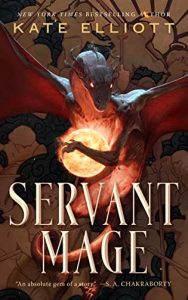 Escape Rating A-: Like the author’s previous novella, Servant Mage, The Keeper’s Six introduces us to a world that is much larger than the relatively small slice we get. Howsomever, very much unlike that previous book, The Keeper’s Six feels like it is just the right length for this story. It would be fantastic to have more, and there are certainly hints in what we have that there could be a more at some future point – but we don’t need that more to feel like this story doesn’t come to a lovely and satisfactory conclusion – because it absolutely does.
Escape Rating A-: Like the author’s previous novella, Servant Mage, The Keeper’s Six introduces us to a world that is much larger than the relatively small slice we get. Howsomever, very much unlike that previous book, The Keeper’s Six feels like it is just the right length for this story. It would be fantastic to have more, and there are certainly hints in what we have that there could be a more at some future point – but we don’t need that more to feel like this story doesn’t come to a lovely and satisfactory conclusion – because it absolutely does.
But this universe is fascinating and seems to have so much more to explore and I’d love to go back. To the point where this is my second reading of the book. I read this for a Library Journal review during the summer and liked it so much that I wanted to visit the world again and liked it even more on the second trip.
Part of what made me pick this back up again was that Esther would fit right into Never Too Old To Save the World, a collection of stories about people in midlife – or a bit later – who get called to be the ‘Chosen One’ for fantasy or SFnal worlds and how their change in fate melds and conflicts – sometimes at the same time – with the life they have already built.
(Never Too Old To Save the World will be out next month. I’ve already read it and it’s wonderful. Review to come!)
Esther is in her mid-60s in The Keeper’s Six. She’s been part of a Hex for most of her adult life, leading expeditions into untracked places, facing untold dangers, never knowing whether she’ll make it back or not. She’s addicted to the adrenaline of the work but aware that her days at it are numbered. The mind and spirit may be willing but time is taking its toll. Her quest has her between the proverbial rock and the opposing hard place. A dragon has kidnapped her son, and what that dragon wants in return is her son’s spouse and the co-parent of their four children.
This dragon eats books – literally not figuratively. But when he does, people – not necessarily humans but people – arise out of nowhere in the midst of his hoard as living representations of the books he’s consumed. I’m amazed and appalled in equal measure – and so is Esther.
There’s just so much going on in The Keeper’s Six. The way the Beyond is stable and unstable at the same time, keeps the Hex on their toes and the reader guessing what will come next. The juxtaposition of the Hex’ utter trust in each other with their interpersonal conflicts makes every situation precarious.
That there are wheels within wheels spinning around their suspension, this quest, the dragon’s questionable motives and their own group dynamics keeps all the plates spinning in their air in a way that kept me riveted through both readings.
The icing on this lovely little cake was that Esther is Jewish and that it wasn’t just window dressing. Her religion and her practice of it mattered both to the story and to the way she conducted herself within it. (That representation also mattered to me on a personal level.) That there is just a touch of romantic possibility between Esther and the dragon’s lieutenant, a man who seems to be the embodiment of the 14th Century Judeo-Persian poet Shahin who wrote about Queen Esther, the biblical queen for whom Esther Green was named provided just the right amount of rueful sweetness in the midst of all the danger and the necessary and important derring do required to fix it.
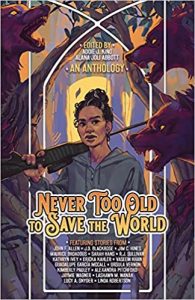 On top of everything else that made The Keeper’s Six so much fun was the way that it seemed to link to so many other wonderful books. Not just the previously mentioned Innkeeper Chronicles by Ilona Andrews, Never Too Old to Save the World and Lost in the Moment and Found by Seanan McGuire, but also Under the Whispering Door by TJ Klune and even a bit of The Merchant Princes by Charles Stross. Portal fantasy seems to be having a moment these days, and I’m absolutely here for it. Because I still want my own door to open.
On top of everything else that made The Keeper’s Six so much fun was the way that it seemed to link to so many other wonderful books. Not just the previously mentioned Innkeeper Chronicles by Ilona Andrews, Never Too Old to Save the World and Lost in the Moment and Found by Seanan McGuire, but also Under the Whispering Door by TJ Klune and even a bit of The Merchant Princes by Charles Stross. Portal fantasy seems to be having a moment these days, and I’m absolutely here for it. Because I still want my own door to open.
In the end The Keeper’s Six was a terrific story set in a world that I’d love to visit again. But if that never happens I’ll still be very satisfied with the trip I did get to take.

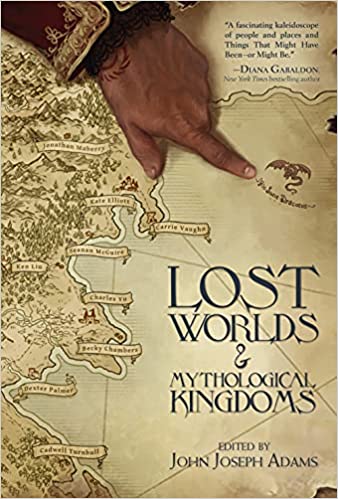 Lost Worlds and Mythological Kingdoms by
Lost Worlds and Mythological Kingdoms by 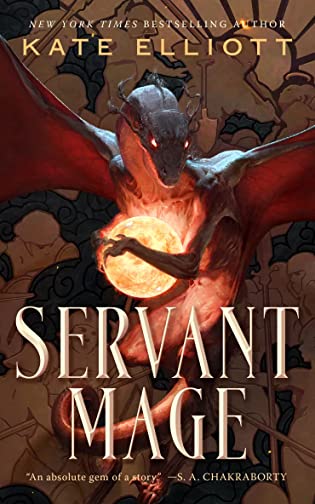 Servant Mage by
Servant Mage by